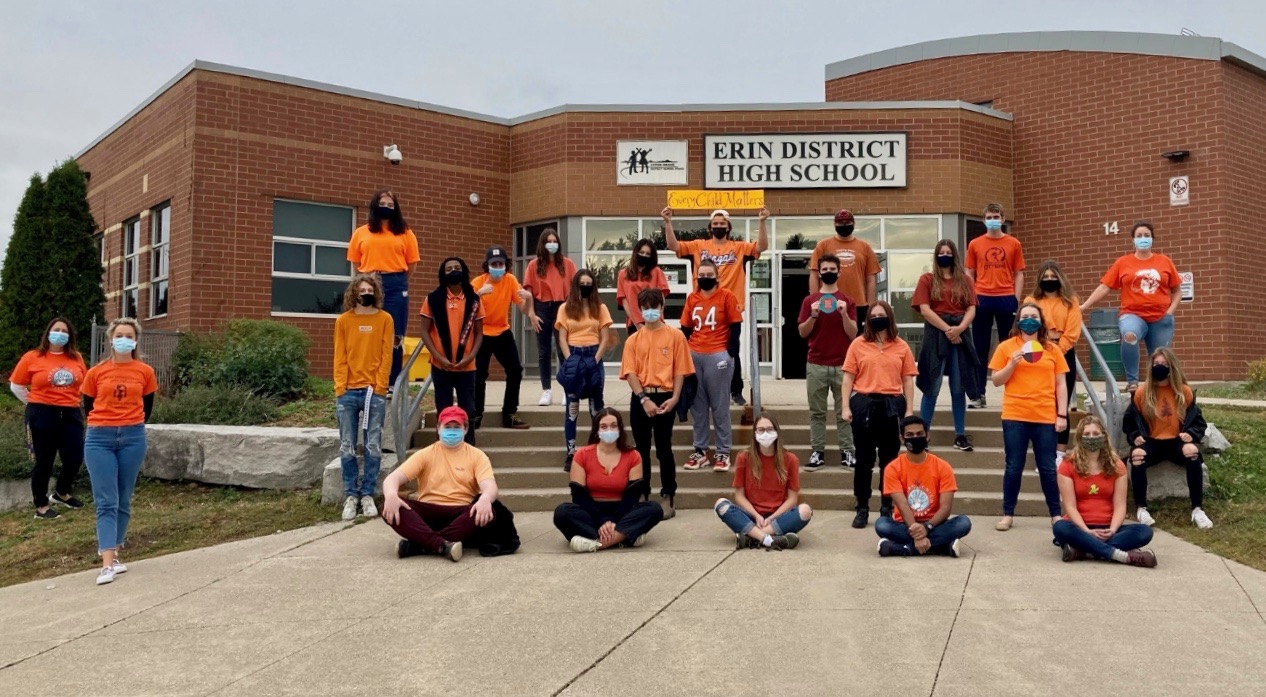WELLINGTON COUNTY – While students at both the Upper Grand and Wellington Catholic district school boards were sporting orange shirts on Sept. 30, it was not a day of celebration.
Orange Shirt Day is meant to recognize the abuse Indigenous people endured in residential schools, and to spark conversations on how to overcome this blight in Canada’s history.
Colinda Clyne, First Nations, Metis and Inuit Education Lead with the Upper Grand District School Board, said Orange Shirt Day officially began in 2013 and is one of the actions that sprang from the Truth and Reconciliation Commission.
“In school, we’re asking people to engage in conversation,” Clyne said.
“It’s an opportunity for understanding. This day commemorates all the children in residential schools and the orange shirt commemorates the story of one survivor.”
That survivor is Phyllis Webstad, who in 1973, on her first day of school, wore an orange shirt given to her by her grandmother.
The shirt was taken from her and was never returned. The event traumatized the little girl and made her feel worthless.
Today the orange shirt is a symbol of the legacy of the residential school system, where Indigenous children were taken from their homes, stripped of their language and culture, and often suffered myriad other abuses.
Clyne said teachers are holding age-appropriate conversations with their students.
“Imagine you were told you had to be taken away from your family to go to school. Is that fair?” Clyne asked, offering an example of how the subject could be approached with kindergarten students.
“In high school they would talk more about what transpired at the schools and how those impacts are still affecting people today.
“Colonialism is still here. The school system is still very colonial.”
Clyne, who is Anishinaabe, said she doesn’t want this just to become a “day” but to be a step toward building awareness and understanding.
“We are more than our trauma,” she said. “This is what resilience looks like.
“There are Indigenous writers and artist and activist to be celebrated. It’s a positive day, too.”
Clyne said discussions have to be held not just in the classroom, but in boardrooms, in police departments, government offices and businesses as well.
“The children in our schools right now will be the government leaders of the future and they will have a better understanding and knowledge about this,” she said.
Clyne said she was worried that Orange Shirt Day could have been missed this year due to COVID-19 and the strain the pandemic has put on teachers.
“It has not been lost, though,” she said.
“Teachers are having those discussions and that’s very heartwarming to me.”

Students and staff members at Norwell District Secondary School in Palmerston also wore orange on Sept. 30. (Twitter photo: @NorwellDSS)
Yvonne Runstedler, program co-ordinator responsible for Indigenous education at the Wellington Catholic District Scool Board, said Indigenous programming will run all week at participating schools in her board.
Teachers will screen videos from the Orange Day website and prompt discussion from that.
“We want to make students understand that we value every child as individual, unique gifts,” Runstedler said.
“They also need to know that is not always the case for some people.”
She added, “Older students will learn more about residential schools and our obligations to Truth and Reconciliation.”
Runstedler said equity and justice programs have been a focus at her board for many years and that has only increased given the events of this year.
“Equity and support for Indigenous programs is important to a lot of educators,” she said.




